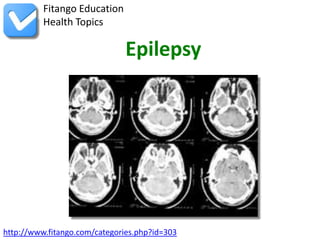
Epilepsy
- 1. Fitango Education Health Topics Epilepsy http://www.fitango.com/categories.php?id=303
- 2. Overview The epilepsies are a spectrum of brain disorders ranging from severe, life-threatening and disabling, to ones that are much more benign. In epilepsy, the normal 1
- 3. Overview pattern of neuronal activity becomes disturbed, causing strange sensations, emotions, and behavior or sometimes convulsions, muscle spasms, and loss of consciousness. The epilepsies have many 2
- 4. Overview possible causes and there are several types of seizures. Anything that disturbs the normal pattern of neuron activity—from illness to brain damage to abnormal brain development—can 3
- 5. Overview lead to seizures. Epilepsy may develop because of an abnormality in brain wiring, an imbalance of nerve signaling chemicals called neurotransmitters, changes in important features of brain cells 4
- 6. Overview called channels, or some combination of these and other factors. Having a single seizure as the result of a high fever (called febrile seizure) or head injury does not necessarily mean 5
- 7. Overview that a person has epilepsy. Only when a person has had two or more seizures is he or she considered to have epilepsy. A measurement of electrical activity in the brain and brain scans such as 6
- 8. Overview magnetic resonance imaging or computed tomography are common diagnostic tests for epilepsy. 7
- 9. Treatment Once epilepsy is diagnosed, it is important to begin treatment as soon as possible. For about 70 percent of those diagnosed with epilepsy, seizures can 8
- 10. Treatment be controlled with modern medicines and surgical techniques. Some drugs are more effective for specific types of seizures. An individual with seizures, particularly those that are not easily 9
- 11. Treatment controlled, may want to see a neurologist specifically trained to treat epilepsy. In some children, special diets may help to control seizures when medications are either not effective or 10
- 12. Treatment cause serious side effects. 11
- 13. Prognosis While epilepsy cannot be cured, for some people the seizures can be controlled with medication, diet, devices, and/or surgery. Most seizures do not cause 12
- 14. Prognosis brain damage, but ongoing uncontrolled seizures may cause brain damage. It is not uncommon for people with epilepsy, especially children, to develop behavioral and emotional problems in 13
- 15. Prognosis conjunction with seizures. Issues may also arise as a result of the stigma attached to having epilepsy, which can led to embarrassment and frustration or bullying, teasing, or avoidance in 14
- 16. Prognosis school and other social settings. For many people with epilepsy, the risk of seizures restricts their independence (some states refuse drivers licenses to people with epilepsy) and recreational 15
- 17. Prognosis activities. Epilepsy can be a life-threatening condition. Some people with epilepsy are at special risk for abnormally prolonged seizures or sudden unexplained death in epilepsy. 16